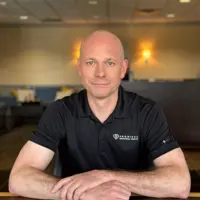About Promises Treatment Centers – South Barrington Avenue
Rehab Score
Accepted Insurance
Other Forms of Payment
Private insurance refers to any kind of healthcare coverage that isn't from the state or federal government. This includes individual and family plans offered by an employer or purchased from the Insurance Marketplace. Every plan will have different requirements and out of pocket costs so be sure to get the full details before you start treatment.
Self-pay involves paying for treatment out of your own pocket. You can use savings or credit, get a personal loan, or receive help from family and friends to fund your treatment. If you don't have insurance or your insurance plan doesn't cover a specific program, self-pay can help ensure you still get the care you need.
Financial aid can take many forms. Centers may have grants or scholarships available to clients who meet eligibility requirements. Programs that receive SAMHSA grants may have financial aid available for those who need treatment as well. Grants and scholarships can help you pai for treatment without having to repay.
Addiction Treatments
Levels of Care
Their medically monitored detox program includes close supervision by an independent team of detox specialists. With more than 20 years of experience managing clients’ withdrawal symptoms using the latest evidence-based approaches, their consulting physicians provide a safe and comfortable detox. This includes the use of safe and effective medications as required, acupuncture, neurofeedback and massage therapy. Their goal with detox is long-term success, not how quickly detox is over. They tailor detox to each client’s specific needs to start their recovery off right.
Residential treatment programs are those that offer housing and meals in addition to substance abuse treatment. Rehab facilities that offer residential treatment allow patients to focus solely on recovery, in an environment totally separate from their lives. Some rehab centers specialize in short-term residential treatment (a few days to a week or two), while others solely provide treatment on a long-term basis (several weeks to months). Some offer both, and tailor treatment to the patient's individual requirements.
12-step programs are addiction recovery models based on Alcoholics Anonymous (AA). A number of substance abuse programs (including some drug and alcohol rehab centers) use the 12 steps as a basis for treatment. Beginning steps involve admitting powerlessness over the addiction and creating a spiritual basis for recovery. Middle steps including making direct amends to those who've been hurt by the addiction, and the final step is to assist others in addiction recovery in the same way. 12-Step offshoots including Narcotics Anonymous (NA), Cocaine Anonymous (CA), Dual Recovery Anonymous (DRA), Sex & Love Addicts Anonymous (SLAA) and Gamblers Anonymous (GA). Although 12-step programs are our mainstay, they have the capability to treat patients and have them participate in alternative programs (Refuge Recovery, SMART Recovery, and others as well as AA meetings that include meditation).
Relapse is common among those trying to overcome alcohol and drug addictions. It is often triggered by stress and exposure to people, places or events associated with past substance abuse. Chronic drinking and drug use damages regions of the brain that are involved in self-control, affecting the ability to regulate cravings and resist relapse. During relapse prevention planning, clients learn to identify specific high-risk situations and skills for coping with them, how to increase their self-care, eliminate myths regarding the effects of alcohol and drugs, manage lapses, and restructure their perceptions of the relapse process. Other goals of relapse prevention therapy are learning how to adopt a balanced lifestyle, positive behaviors and stimulus control techniques, and developing a plan for what to do to avoid relapse. The Promises Alumni Association makes available to clients and their families a variety of resources, including meetings, workshops, special events and follow-up. Their staff has access to a network of support groups and alumni to help you find the support you need after you graduate, no matter where you live.
At certain points in the recovery process, it's important to have support available 24/7. 24-hour clinical care offers a safe environment in which to recover from drug or alcohol addiction in peace, knowing medical detox and other treatment will happen with professionals on hand.
We offer an intensive outpatient rehab program in Santa Monica, California, specifically designed for busy adults ages 26+ who need addiction or mental health help. Clients in our outpatient rehab centers meet three mornings per week, allowing them to receive exceptional treatment without sacrificing work, school or other commitments in their everyday lives.
Outpatient Programs (OP) are for those seeking mental rehab or drug rehab, but who also stay at home every night. The main difference between outpatient treatment (OP) and intensive outpatient treatment (IOP) lies in the amount of hours the patient spends at the facility. Most of the time an outpatient program is designed for someone who has completed an inpatient stay and is looking to continue their growth in recovery. Outpatient is not meant to be the starting point, it is commonly referred to as aftercare.
Intervention services helps family or friends of addicts stage an intervention, which is a meeting in which loved ones share their concerns and attempt to get an addict into treatment. Professional intervention specialists can help loved ones organize, gather, and communicate with an addict. They can guide intervention participants in describing the damage the addict's behavior is causing and that outside help is necessary to address the addiction. The ideal outcome of an intervention is for the addict to go to rehab and get the help they need.
Treatments
The goal of treatment for alcoholism is abstinence. Those with poor social support, poor motivation, or psychiatric disorders tend to relapse within a few years of treatment. For these people, success is measured by longer periods of abstinence, reduced use of alcohol, better health, and improved social functioning. Recovery and Maintenance are usually based on 12 step programs and AA meetings.
Drug rehab in California teaches participants constructive ways to stay clean and sober. Treatment revolves around helping individuals stop using the substance they are addicted to and learn healthy habits to avoid relapse.
Many of those suffering from addiction also suffer from mental or emotional illnesses like schizophrenia, bipolar disorder, depression, or anxiety disorders. Rehab and other substance abuse facilities treating those with a dual diagnosis or co-occurring disorder administer psychiatric treatment to address the person's mental health issue in addition to drug and alcohol rehabilitation.
A combined mental health and substance abuse rehab has the staff and resources available to handle individuals with both mental health and substance abuse issues. It can be challenging to determine where a specific symptom stems from (a mental health issue or an issue related to substance abuse), so mental health and substance abuse professionals are helpful in detangling symptoms and keeping treatment on track.
Opioid rehabs specialize in supporting those recovering from opioid addiction. They treat those suffering from addiction to illegal opioids like heroin, as well as prescription drugs like oxycodone. These centers typically combine both physical as well as mental and emotional support to help stop addiction. Physical support often includes medical detox and subsequent medical support (including medication), and mental support includes in-depth therapy to address the underlying causes of addiction.
Programs
At Promises Treatment Centers - South Barrington Avenue, everyone is treated with respect and compassion. This is a safe place for you and your loved ones to be authentic and vulnerable and to work through the issues that have held you back. Within an accepting space, gay, lesbian, bisexual, transgender, questioning or intersex clients can feel safe and supported by other clients and our treatment team, which includes LGBT staff who have an intimate understanding of the challenges that LGBT clients face in recovery.
Young adulthood can be an exciting, yet difficult, time of transition. Individuals in their late teens to mid-20s face unique stressors related to school, jobs, families, and social circles, which can lead to a rise in substance use. Rehab centers with dedicated young adult programs will include activities and amenities that cater to this age group, with an emphasis on specialized counseling, peer socialization, and ongoing aftercare.
Clinical Services
Cognitive-Behavioral Therapy (CBT) teaches people to recognize moods, thoughts and situations that cause drug cravings and other addictive behavior. A therapist trained in cognitive-behavioral therapy techniques helps a person avoid these triggers and replace negative thoughts and feelings with healthier ones. Since the skills learned using cognitive-behavioral therapy can last a lifetime, CBT is a powerful, evidence-based treatment for drug abuse. A 2011 study found that CBT, either alone or as an adjunct to medication, is an effective technique in the prevention of relapse. Another study found that CBT is helpful in treating bulimia. Other research shows that group and individual CBT are associated with significant and clinically meaningful reductions in adolescent substance use.
Whether a marriage or other committed relationship, an intimate partnership is one of the most important aspects of a person's life. Drug and alcohol addiction affects both members of a couple in deep and meaningful ways, as does rehab and recovery. Couples therapy and other couples-focused treatment programs are significant parts of exploring triggers of addiction, as well as learning how to build healthy patterns to support ongoing sobriety.
Creative expression through art therapy is not only relaxing but helps clients connect with their inner selves through the inspiration of images and their physical manifestation in artistic expression. Art therapy helps restore physical, mental and emotional well-being. Some clients in rehab who have difficulty communicating verbally may be able to use art therapy to express themselves. This type of therapy can help in resolving issues, identifying and managing feelings and behaviors, and improving awareness and self-esteem. Research has found that art therapy can be a beneficial treatment for psychiatric disorders.
Dialectical behavior therapy (DBT), originally developed by Marsha M. Linehan, PhD, teaches people the skills to cope with stress, control emotions and improve relationships with others. DBT has proven effective in adults and adolescents with a range of psychiatric conditions and behavioral problems. Initially developed for individuals with borderline personality disorder (BPD), DBT has been adapted to several other populations with promising results. One study showed participants improve in seven of nine variables analyzed, including anxiety, depression, global psychopathology, interpersonal functioning, self-mutilation and social adjustment. Research on psychological therapies for people with BPD showed that dialectical behavioral therapy has been studied most intensively and demonstrates “statistically significant superiority” over client-centered therapy.
Equine therapy gives clients direct, regular contact with horses, which provides physical, emotional, and mental rewards. Equine therapy can decrease hostility and feelings of anger, lower stress levels, increase trust, improve self-esteem, and provide a greater sense of patience. When a horse is paired with a troubled person, a bond gradually develops between them. Horses are extremely sensitive to the feelings and emotions of humans—they will take whatever emotions or feelings that they are receiving from a human and reflect them back to the person. Once a connection has been established between animal and human, positive change is quickly promoted within the individual.
Experiential therapy is a form of therapy in which clients are encouraged to surface and work through subconscious issues by engaging in real-time experiences. Experiential therapy departs from traditional talk therapy by involving the body, and having clients engage in activities, movements, and physical and emotional expression. This can involve role-play or using props (which can include other people). Experiential therapy can help people process trauma, memories, and emotion quickly, deeply, and in a lasting fashion, leading to substantial and impactful healing.
EMDR is a therapeutic modality originally developed to help process trauma. In an EMDR session, a patient is prompted to undergo eye movements that mimic those of REM sleep. This is accomplished by watching a therapist's finger move back and forth across, or following a bar of light. The goal is repetitive sets of eye movements that help the brain reprocess memory, which can significantly reduce the intensity of remembered traumatic incidents. Associated memories can heal simultaneously, leaving patients significantly calmer, more stable, and more emotionally relaxed.
Family therapy is a type of psychotherapy that is designed to help family members improve communication and resolve their conflicts. Typically this therapy is performed by a licensed therapist, clinical social worker or a psychologist. Since addiction is a family disease, it is important for other members of the family to receive treatment so that they can deal with specific issues relating to the family member’s substance abuse, mental illness or other problems. At Promises, they have found that about 90 percent of family members want to be involved in the treatment of their loved one. Their family therapy program is designed to help family members gain awareness and understanding, so that they can learn how to best support their loved one and themselves. Family therapy may include all or only some family members. The specific treatment plan depends on family needs. They employ two full-time family therapists who meet individually with their client to work on individual family issues and also provide education and support for the client’s significant others.
Alcohol and drug addiction leads to isolation. Reconnecting addicted individuals to a group or community can help address several important recovery-related issues. In fact, clinical studies show that group therapy sessions can be equally as effective as individual therapy in promoting long-term addiction recovery. Group therapy modalities include support groups, psychoeducational groups, skills development groups, and cognitive behavioral groups, among others
In individual therapy, a patient meets one-on-one with a trained psychologist or counselor. Therapy is a pivotal part of effective substance abuse treatment, as it often covers root causes of addiction, including challenges faced by the patient in their social, family, and work/school life.
Promises Treatment Centers - 3743 South Barrington Avenue allows clients to have access to newspapers and magazines, listen to the radio, call loved ones, and watch TV at appropriate times, with supervision. By utilizing a real-world perspective, Promises prepares clients for day-to-day life, such as driving past a liquor store or reading an advertisement for an alcoholic beverage. The key is that Promises teaches clients how to process feelings that may arise while exposed to these situations.
A balanced diet is essential to lasting recovery. Most clients are malnourished at the time of their admittance to Promises, so it is important to restore them to physical health through nutrition. Nutritional counseling helps clients learn how to make healthy food choices, which is important in achieving a healthy lifestyle. Foods that are high in nutrients can help rebuild damaged tissues and organs and improve functioning of the nervous and gastrointestinal systems. Research has also shown that a diet that is rich in protein and the right kind of carbohydrates can reduce cravings for alcohol and drugs. Food also affects our moods, so getting enough folic acid and B vitamins is essential to improving mood. Sugar and caffeine can contribute to mood swings, so it is important for those in recovery to avoid both as much as possible. Clients will learn beneficial information like this through nutritional counseling at Promises.
Trauma therapy addresses traumatic incidents from a client's past that are likely affecting their present-day experience. Trauma is often one of the primary triggers and potential causes of addiction, and can stem from child sexual abuse, domestic violence, having a parent with a mental illness, losing one or both parents at a young age, teenage or adult sexual assault, or any number of other factors. The purpose of trauma therapy is to allow a patient to process trauma and move through and past it, with the help of trained and compassionate mental health professionals. If you have experienced trauma or loss,Promises Treatment Centers - South Barrington Avenue offers powerful tools in the treatment of traumatic stress, such as EMDR and somatic therapy.
Amenities
-
Residential Setting
-
Private Setting
-
Yoga Studio
-
Wifi
-
Private Rooms
Staff & Accreditations
Staff

Scott Sasserson
Chief Executive Officer

Pubali Chakravorty, SHRM-SCP
President

Trish Caldwell, MFT, LPC, CAADC, CCDP-D, CCTP
Senior Vice President, Clinical Services

Gayle Jones, SPHR
Senior Vice President, Human Resources
Accreditations

The Joint Commission, formerly known as JCAHO, is a nonprofit organization that accredits rehab organizations and programs. Founded in 1951, the Joint Commision's mission is to improve the quality of patient care and demonstrating the quality of patient care.
Joint Commission Accreditation: Yes

The Substance Abuse and Mental Health Services Administration (SAMHSA) is a branch of the U.S. Department of Health and Human Services. Established in 1992 by congress, SAMHSA's mission is to reduce the impact of substance abuse and mental illness on American's communities.
SAMHSA Listed: Yes
Contact Information
3743 South Barrington Avenue
Los Angeles, CA 90066




